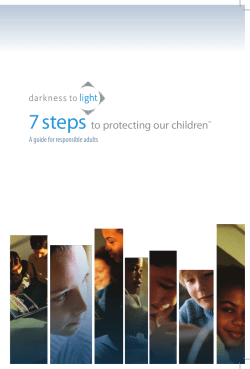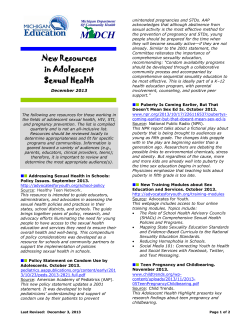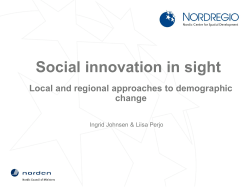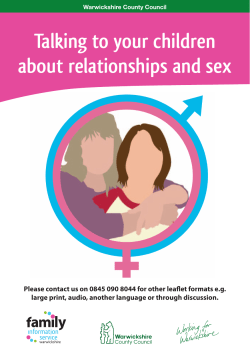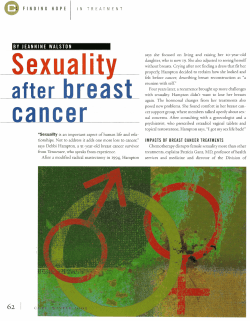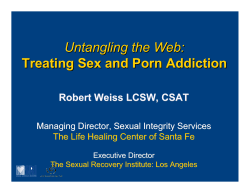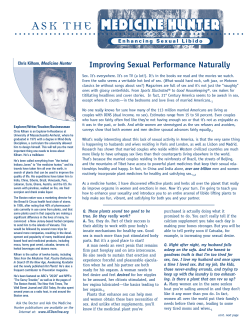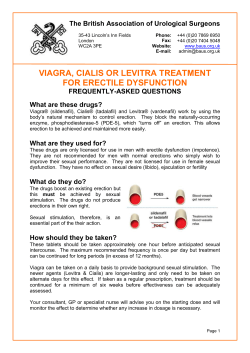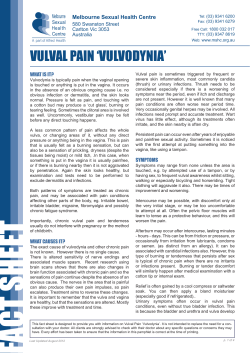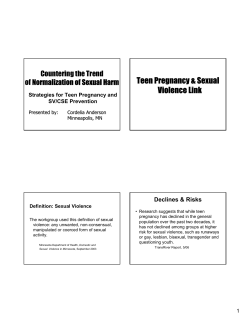
Sexual HealtH of Young PeoPle in tHe u.S. SoutH: Challenges and Opportunities
Sexual Health of Young People in the U.S. South: Challenges and Opportunities Yanyi K. Djamba, Theresa C. Davidson, and Mosisa G. Aga www.demographics.aum.edu March 2012 Sexual Health of Young People in the U.S. South: Challenges and Opportunities I Center for Demographic Research, Auburn University at Montgomery II TABLE OF CONTENTS Acknowledgments . . . . . . . . . . . . . . . . . . . . . . . . . . . . . . . . . . . . . . . . . . . . . . . . . . . . . . i Notes to Users and Suggested Citation . . . . . . . . . . . . . . . . . . . . . . . . . . . . . . . . . . . . ii Executive Summary . . . . . . . . . . . . . . . . . . . . . . . . . . . . . . . . . . . . . . . . . . . . . . . . . . 3 Introduction . . . . . . . . . . . . . . . . . . . . . . . . . . . . . . . . . . . . . . . . . . . . . . . . . . . . . . 12 The Challenges: Poor Sexual Health Correlates with Sociodemographic Factors . . . . . . . . . . . . . . . 16 The Opportunities: Medically Accurate, Age-Appropriate, Evidence-Based and Evidence-Informed Sexual Health Education . . . . . . . . . . . . . . . . . . . . . . . . . . . . . . . 22 Conclusion . . . . . . . . . . . . . . . . . . . . . . . . . . . . . . . . . . . . . . . . . . . . . . . . . . . . . . . . 30 Appendix A: State Profiles . . . . . . . . . . . . . . . . . . . . . . . . . . . . . . . . . . . . . . . . . . . . . 31 Appendix B: Data And Methods . . . . . . . . . . . . . . . . . . . . . . . . . . . . . . . . . . . . . . . . 68 Sexual Health of Young People in the U.S. South: Challenges and Opportunities III Acknowledgments The Center for Demographic Research at Auburn University at Montgomery (AUM) would like to thank the following individuals for their contributions in the preparation of this report: Casey A. Borch, Research Associate, Center for Demographic Research-AUM and Assistant Professor, Department of Sociology, University of Alabama at Birmingham, reviewed earlier versions of the manuscript and provided valuable comments and suggestions. Erin K. Brown, Program Assistant, Center for Demographic Research-AUM, compiled the data, prepared charts, and worked closely with the authors in the preparation of the report. Sylvie Eke Aba, Graduate Research Assistant, Center for Demographic Research-AUM, participated in data research during the first four months of the project. Charise Alexander, Administrative Coordinator, and Winfred Hawkins, Graphic Designer, University Relations-AUM, helped with the design of the cover page of this report. Megan Hughes, Divisional Coordinator for Events & Promotions, University Outreach-AUM, provided good advice for report design. Teresa Purcell, President, Purcell Public Affairs, Inc.; Elizabeth A. Sullivan, Independent Consultant; Ellen Liu, Program Officer, Reproductive Health, Irene Schneeweis, Senior Manager, Strategic Communications and Patricia Eng, Vice President, Grants and Capacity Building at the Ms. Foundation for Women, reviewed the manuscript and provided valuable editorial assistance. The authors also thank the Ms. Foundation for Women for commissioning this project, as well as the various state sexual health partners for providing additional data and information used in this report. Many thanks to Larry C. Mullins, Professor Emeritus of Sociology-AUM, and to Sitawa R. Kimuna, Associate Professor of Sociology at East Carolina University, for serving as external reviewers. Their comments and suggestions helped improve the quality of this report. Yanyi K. Djamba Director, Center for Demographic Research Professor of Sociology Auburn University at Montgomery Sexual Health of Young People in the U.S. South: Challenges and Opportunities i NOTES TO USERS AND SUGGESTED CITATION The information contained in this publication may be freely used or reproduced, provided that appropriate credit is given to the authors and to the Center for Demographic Research. The suggested citation is: Djamba, Y.K., Davidson, T.C., and Aga, M.G. (2012). Sexual Health of Young People in the U.S. South: Challenges and Opportunities. Montgomery, Alabama: Center for Demographic Research. The Center for Demographic Research welcomes the comments and advice of its data and report users. All questions or comments should be sent to: Center for Demographic Research, Auburn University at Montgomery, P.O. Box 244023, Montgomery, Alabama 36124-4023, voice 334-244-3463 (TDD 334-244-3800), fax: 334-244-3443, cdr@aum.edu, www.demographics.aum.edu. Center for Demographic Research, Auburn University at Montgomery ii Sexual Health of Young People in the U.S. South: Challenges and Opportunities Executive Summary The United States has the highest rates of teenage pregnancy and sexually transmitted diseases among all developed nations.1 This is even more severe in the southern region of the U.S. which has: higher teenage pregnancy rates; higher teenage births; a higher percentage of babies of low birth weight; and higher rates of sexually transmitted infections, including HIV, than other regions of the country. This report, Sexual Health of Young People in the U.S. South: Challenges and Opportunities, examines the current challenges and opportunities related to the sexual health of young people in 10 Southern states: Alabama, Georgia, Kentucky, Louisiana, Mississippi, North Carolina, South Carolina, Tennessee, Virginia, and West Virginia. The report will use the terms Southern states and U.S. South to refer to only these 10 states; the analysis does not include several other states that are sometimes included in definitions of the southern region such as Florida, Texas, Arkansas, and Oklahoma. It includes a profile of key sociodemographic factors in the South relevant to sexual health, including: population growth, race, poverty, and women’s educational attainment. The report then looks at the sexual health profile of young people including indicators such as: sexually transmitted infections, HIV, teenage pregnancy, teenage birth, and low birth weight. Finally, the report explores sexual health education practices in the Southern states and the challenges and opportunities they offer to improve the sexual health of young people in the U.S. South. The U.S. South is characterized by high population growth and high poverty During the last ten years, the population of the 10 Southern states in this report grew by 11.9 percent: from 50,626,423 in 2000 to 56,668,395 in 2010.2, 3 In fact, the U.S. South is the second fastest growing region in the nation, just behind the Western region. During the same time period, the national growth rate was 9.7 percent.4 These 10 Southern states were home to 18 percent of the U.S. population in 2010. 1 Stanger-Hall, K.F. and Hall, D.W. (2011). Abstinence-Only Education and Teen Pregnancy Rates: Why We Need Comprehensive Sex Education in the U.S. PLoS ONE 6 (10), e24658. http://www.plosone.org/article/info%3Adoi%2F10.1371%2Fjournal.pone.0024658, accessed December 17, 2011. 2 U.S. Census Bureau’s American Fact Finder website, DP-1: Profile of General Demographic Characteristics: 2000. http://factfinder2.census.gov/, accessed December 18, 2011. 3 Census Bureau’s Small Area Income and Poverty Estimates website. http://www.census.gov/cgi-bin/saipe/national.cgi?year=2009&ascii, accessed December 17, 2011. 4 According to the Census Bureau, the U.S population grew by 9.7 percent between 2000 and 2010. http://2010.census.gov/2010census/data/apportionment-pop-text.php, accessed December 20, 2011. Sexual Health of Young People in the U.S. South: Challenges and Opportunities 3
© Copyright 2025


